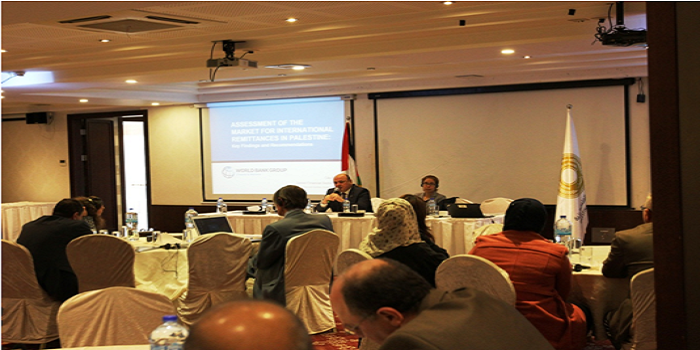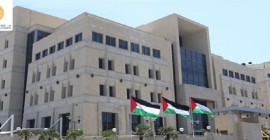Workshop: Reducing the Cost of Remittances will Provide Economy with Millions Annually

Translated by Sabrin Qadah
PMA organized in collaboration with the World Bank Group and a workshop to discuss "the World Bank report on foreign remittances outputs to and from Palestine" at the Grand Park Hotel in Ramallah.
Governor of the Monetary Authority pointed out that this workshop is gaining special importance because remittances are important and vital to Palestine because of the large number of Palestinians living in diaspora. The total of remittances through organized channels reaches to about 26 percent of GDP, making Palestine one of the most remittances-dependent countries in the world.
His excellency Azzam Shawa explained that many of the laws and decrees cover payment and remittance systems in Palestine, including laws against money laundering and terrorism financing. However, there is no comprehensive coverage of electronic payments in these various laws and decrees that cover payment and transactions systems in Palestine, including the National Payment system laws. Al-Shawa also pointed out that electronic transactions law has been drafted, sponsored by the Ministry of communications and information technology, which is in the process of being adopted but needs to be strengthened by the completion of other legal efforts designed to cover all sorts of tools and electronic payment operations.
Shawa added that the legal framework in Palestine does not allow non-banking organizations to offer payment services directly or issuance of electronic money, including small companies, telecommunications companies and funds transfer companies and other institutions, creating a monopoly in the remittance market in favor of Western Union and MoneyGram, resulting in shortness of customer options.
The Governor of the Monetary Authority saw that there is room for the development of remittance market by introducing improvements that focus on enhancing transparency, consumer protection, reducing costs, diversifying channels and extending a network of access points. He stressed on the importance of creating a more open regulatory system, allowing non-banking institutions to offer payment services including innovative ones such as electronic money, continuing to make improvements to the infrastructure of the payment system, including and wherever possible the direct exchange with payment systems in Israel and Jordan, and removing all competitive constraints that promote monopoly remittances market.
For her part, Marina Lewis, Qatari Director of the World Bank, said that the remittance market carries significant positive effects on the Palestinian economy in general, as Palestine is one of the most dependent countries on remittances in the world, noting that a review of the World Bank to market transfers indicates that the cost of money transfers to Palestine is high compared with the global average.
She added that reducing the cost to the global average by improving competition and diversification of channels of remittances will benefit the national economy and the Palestinian families by about 80 million annually.




